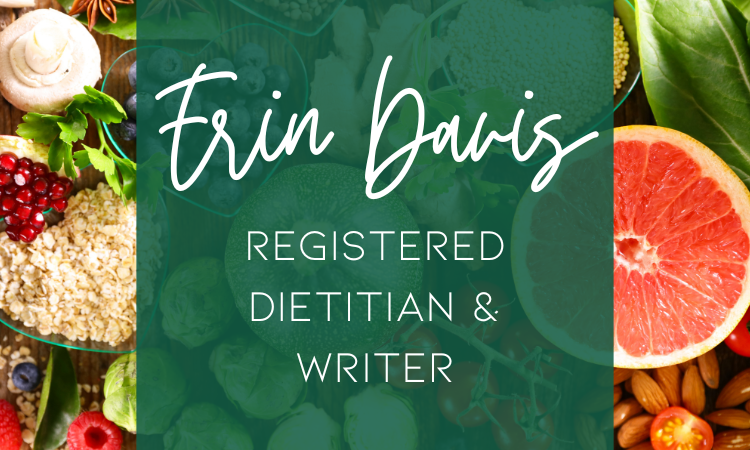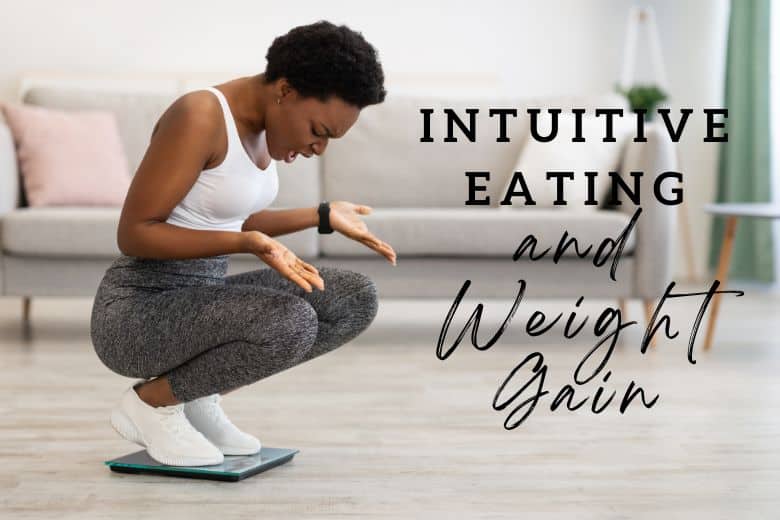Intuitive eating and weight gain sometimes go hand-in-hand. You are no longer restricting and you are finally allowing yourself to eat the foods you love. So you gain weight. In a body-obsessed culture, weight gain is often hard to take. How do you handle it?
Anyone alive has dealt with weight gain at some point in life. Whether you have tracked your weight on the scale or feel it in your clothes, weight fluctuations are common and natural for most of us.
The majority of people will experience weight gain, whether it’s due to aging, lifestyle changes, stress, lack of sleep, medications, or other factors.

As someone over 40, my body has changed. I will never again have my pre-baby body. And I’ve accepted that. Diet culture tells us to freak out about extra pounds. However, with intuitive eating, you are learning to respect and honor your body.
During the process of becoming an intuitive eater, some may find that they gain weight. In my experience, this weight typically levels off or goes back down, but that isn’t always the case.
Your body is an amazing creation. It can lift heavy things, run marathons, give birth, feed babies, fight illness, and more!
The trick is letting go of an ideal weight and focusing on the good. Rather than jumping right back on the dieting bandwagon, I challenge you to trust the process.
If you’re new here, welcome! I’m Erin, an anti-diet dietitian who specializes in intuitive eating, diabetes, PCOS, eating disorders, and athletic performance. I like to approach all nutrition-related goals with a weight-inclusive lens. In other words, I couldn’t care less about your weight.
You deserve to enjoy your life without shame or a label about your weight. I want people to achieve freedom from dieting while managing their health conditions. And it all can be done without restriction or weight checks.
Today, I’m discussing strategies to help you navigate intuitive eating and weight gain. Let’s consider your health beyond the scale.

List body positives
We tend to scrutinize our bodies in the mirror and the negative self-talk is on repeat. I’m challenging you to focus on the positives. Think about all of the things your body was able to accomplish—and write them down.
Were you able to get out of bed this morning? Walk up any stairs? Function at work? List all of things. Even if they seem trivial. Here’s what it might look like:
- Slept well and felt rested
- Got out of bed and stretched
- Made much-needed coffee
- Cleaned my house
- Hugged my husband
- Harvested the garden
- Jumped on the trampoline with my kids
- Cooked dinner
- Lifted weights
- Walked the dogs
- Fought off viruses and bacteria
Don’t get bogged down by the things your body isn’t. Instead, reflect on all of the things your body can do. It really is amazing that our bodies are always at work, without much effort on our part. Take the time to appreciate all of your body’s functions.
Being thankful for your body can go a long way. In fact, studies have shown that gratitude can reduce stress and pain, enhance our overall health, and aid in depression.

Reflect on the benefits of intuitive eating
Did you know that dieting may cause more harm than good? People see short-term benefits to weight loss, but it’s rare to keep weight off. And what does dieting do to your relationship with food? Do you feel out of control around food? Will you trust yourself around certain foods?
Intuitive eating has multiple benefits. Not only do you eat a wider variety of foods when you aren’t dieting, but you are paying attention to your natural hunger and fullness cues. And you are more likely to eat fruits and vegetables than a dieter.
It has been found that intuitive eating correlates with health behaviors—more movement, more sleep, and less screen time.
Eating is done mindfully. No more distracted eating. Intuitive eaters have better psychosocial health—meaning they have better self-esteem, lower social pressure, and less disordered eating behavior.
Other studies have proven intuitive eating is associated with better postpartum health, improved glucose control, and reduced binge eating.
Often people diet to get these same benefits. Improved health. It stands to reason that YOU DON’T have to lose weight in order to be healthy.
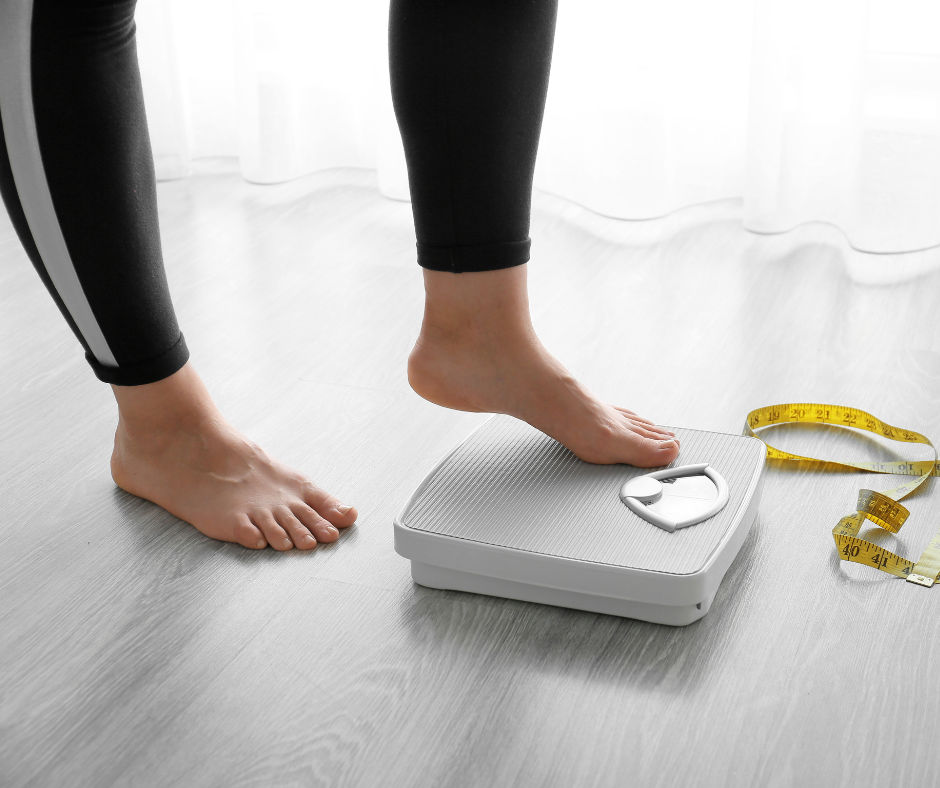
Evaluate your weight goal
When I see a client who wants to lose weight, my first question is, “Why?”. Do you think you’ll be happier? Is it for health reasons? Are you convinced that other will like you better?
Weight loss is possible with great effort. Everyone who has tried to lose weight usually has some degree of success. However, when you look at the long-term research of those who diet, almost everyone gains the weight back. Sometimes more.
Think back to when you first thought you needed to lose weight. For most people, that was in their teens or early adulthood. Since that time, were you ever able to lose weight and keep it off?
We trick ourselves into thinking that we can restrict and eat very little in order to lose weight. And that when we lose the weight and get to our “goal weight”, we’ll be able to eat normally and maintain our weight loss. In my 18 years as a dietitian, I’ve yet to find someone who was able to do that.
It isn’t because everyone has a lack of willpower or sucks at life. It isn’t that at all. After restriction, you feel so deprived that you finally allow yourself a favorite food— and it ends in a binge. And then feel guilty about eating too much and subsequently gaining weight.
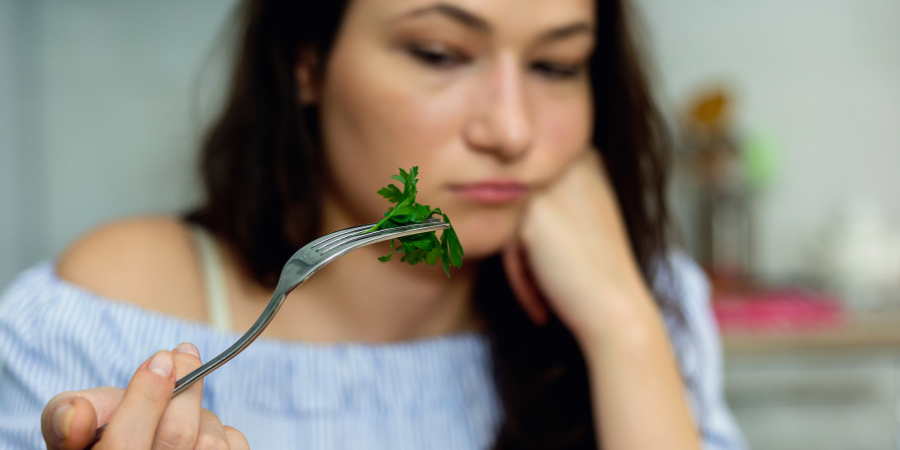
So the cycle continues. Restrict. Binge. Repeat. Makes weight loss a lifelong pursuit. And I have to wonder if you think it’s worth it. If you had one week to live, or one year for that matter, would you diet? Would your weight matter?
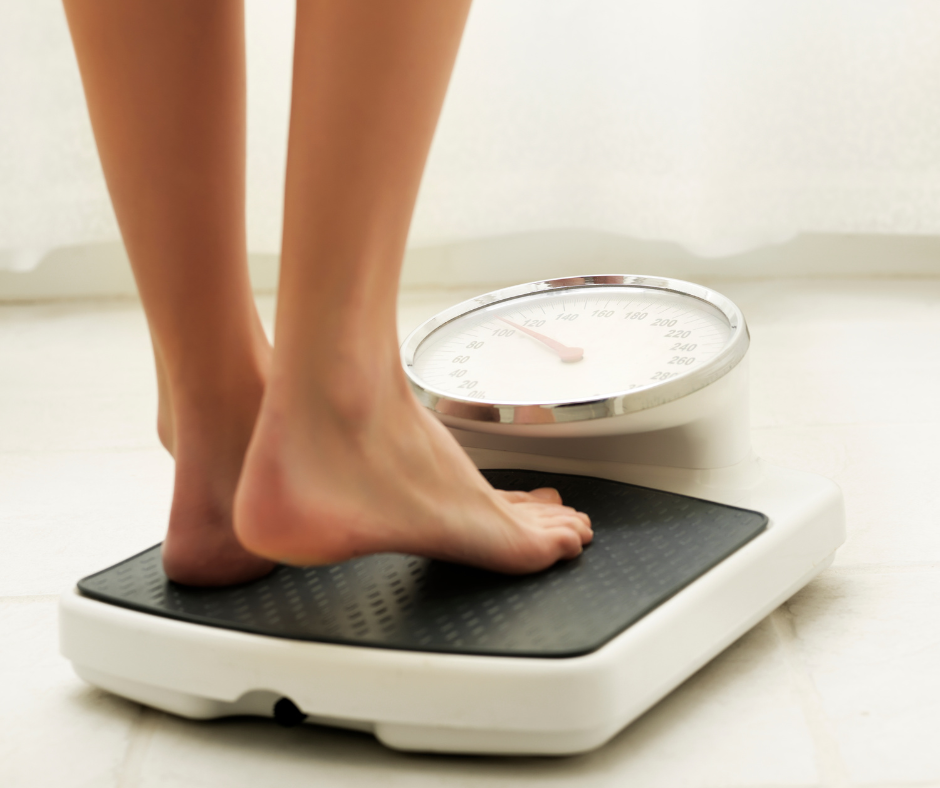
Ditch the scale
Once you decide that you can let go of the goal of weight loss, the next thing that has to go is the scale. Weighing yourself will only hinder your intuitive eating journey.
I know it’s difficult to let go of the scale. You may think that if you weigh yourself, you can keep yourself on track and prevent weight gain. It’s a false sense of hope.
Think about the past. Has weighing yourself gotten you to your “goal weight”? Do you feel accomplished? What does weighing yourself do to your mental health? Did it change the way you ate that day?
The scale is a jerk. Plain and simple. It makes you feel inadequate. The scale acts as an external cue for eating, or not eating. Rather than listening to your biological hunger and fullness cues, that number tells you to eat less.
Have you ever decided to blow your diet because your efforts aren’t working? You think, “Screw it!” Because your weight isn’t what you want it to be, you binge. Ever been there? Most dieters have.
What does the scale do for you? Probably nothing. So please experiment with me. Stop weighing yourself for a month. See what it does to your mental health and your food intake.
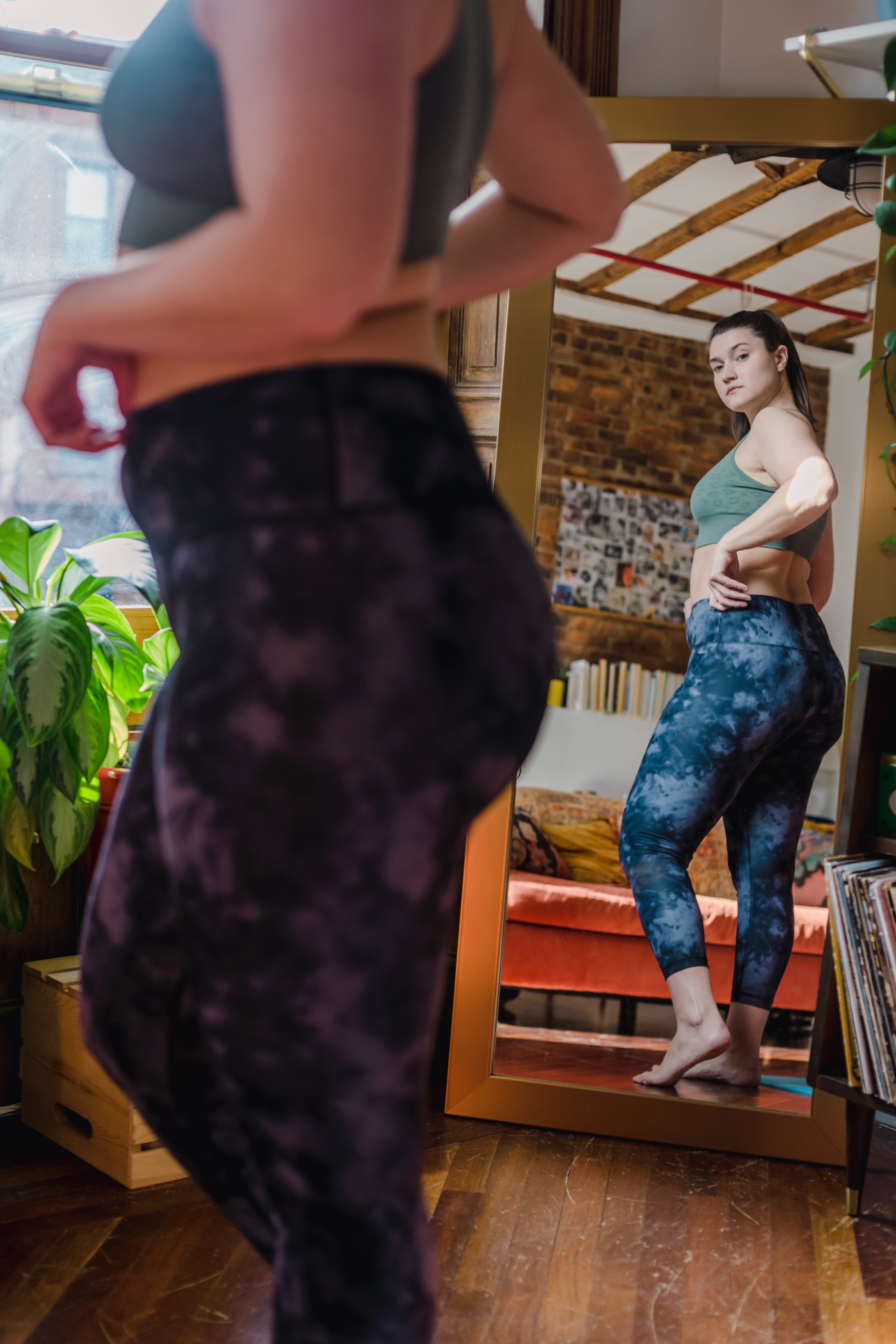
Stop body-checking
Body checking is the act of monitoring your body and it’s fatness or appearance. Whether you are checking out your reflection in the mirror, or you’re pinching the roll above your waistline, you are body checking.
When we diet, we become obsessed with our progress. We look in the mirror to see if we can see a difference. Or we’ll try on something that may be too small to see how it compares to the last time we put it on.
Body checking does us no favors. Trust me. Looking at your naked body in the mirror will not be the best move—especially if you’ve gained a bit of weight.
I’ve written more about body checking and how to stop here. Consider the ways you body check. And then try to eliminate the behavior.
Limit your mirror time. Only check your reflection after you’ve pulled your outfit together, or to see if you have kale in your teeth. Cover the mirror if you must.
You also have to stop weighing yourself. You don’t need that constant feedback. In addition, you stop pinching and grabbing your rolls. Be mindful of the behavior and check-in to see what it does to you mentally.
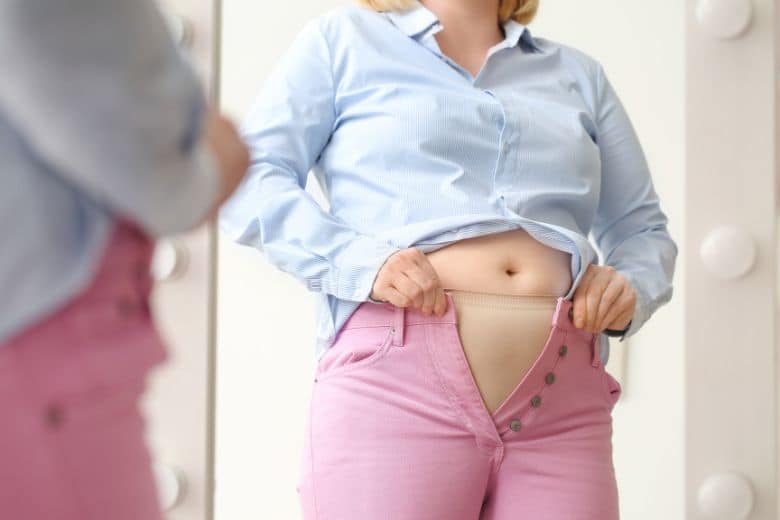
Wear comfortable clothes
If your clothes are too tight, you will be constantly reminded of your weight gain. While you are on your intuitive eating journey, wear clothes that fit well.
Go for the jeans that have a little stretch so you are comfortable. You may feel better in loose and flowy tops that aren’t pulled tight against your body.
While you don’t have to get rid of all of your too-small clothes, ditch the ones that have never fit. You know the ones. Those clothes you bought that you planned to wear when you lost weight. The reminder in your closet that you failed at dieting. DONATE.
It may take a few months to settle into your comfortable, biological set-point weight. Don’t spend too much money on clothes just yet.
And remember that sizes are just numbers. Not to mention that we have been victims of vanity sizing for a long time. It’s time to let go of the number and focus on what fits.
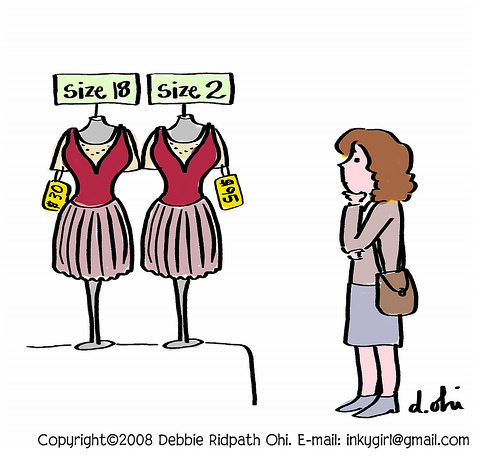
Practice self-compassion
Being compassionate with yourself can improve your body image over time. But it will take a conscious effort. Remember that you are embarking on a journey to heal your relationship with food. It’s not going to happen overnight. Give yourself grace and compassion.
How would you treat a friend going through the same thing? You would likely be patient, encouraging, and empathetic.
Try to treat yourself with that same empathy and understanding. You are much more than your weight. Consider what you want your legacy to be. How do you want people to remember you? That you met your “goal weight” or that you were a good, successful, thoughtful, caring person?
Life is so much more than your weight. Is your weight worth the mental energy it takes up?

Take a social media break
Social media can be a major drag on your self-image. If your social media feed is filled with half-naked fitness influencers who have six-pack abs, you may need to take a break.
It’s no surprise that social media and exposure to images to other people’s “perfect” bodies have a negative impact on your own body image.
The negativity and anxiety you may feel after scrolling can also affect your food choices. So instead of choosing foods based on your personal preferences and cravings, you may unintentionally restrict your food intake.
Social media drives a desire for thinness. Comparison is the thief of joy. And here’s why. This constant comparison and exposure to unrealistic bodies increases body dissatisfaction and the risk of eating disorders.
If you can’t take a complete break from social media, I understand. It’s become a necessary form of communication for most people and organizations.
Instead, unfollow the people who make you feel like you aren’t thin enough, that you aren’t doing enough, that you aren’t enough. Period.

Don’t go it alone
If you find that your weight gain is causing physical or emotional distress, consider seeking guidance from a healthcare professional.
Please don’t feel like you have to deal with things on your own. The emotions we have about our bodies can be complex and overwhelming. It takes time to heal from a lifetime of negative self-talk, food rules, and bad body days.
Share your journey with friends and family who can provide emotional support and encouragement. Let them know you are avoiding diet talk. Surround yourself with positive people who boost you up.
Navigating intuitive eating and weight gain
Embracing intuitive eating and possible weight gain is a journey that requires acceptance, patience, self-compassion, and a focus on overall health and well-being.
We know that you can improve your health by eating a nutrient-rich diet and getting regular physical activity. Additionally, getting adequate sleep and minimizing stress can also reap health benefits. So let’s stop focusing on a metric that is nearly impossible to move, and focus on what YOU CAN change.
If you need help making those changes or if you are struggling to accept your body as it is, I’m here to help. Remember that your worth is not determined by your weight, and you deserve to feel good no matter your size. I want you to find peace with food.
References:
- Memon AN, Gowda AS, Rallabhandi B, et al. Have Our Attempts to Curb Obesity Done More Harm Than Good?. Cureus. 2020;12(9):e10275. Published 2020 Sep 6. doi:10.7759/cureus.10275
- Christoph MJ, Hazzard VM, Järvelä-Reijonen E, Hooper L, Larson N, Neumark-Sztainer D. Intuitive Eating is Associated With Higher Fruit and Vegetable Intake Among Adults. J Nutr Educ Behav. 2021;53(3):240-245. doi:10.1016/j.jneb.2020.11.015
- Hazzard VM, Burnette CB, Hooper L, Larson N, Eisenberg ME, Neumark-Sztainer D. Lifestyle health behavior correlates of intuitive eating in a population-based sample of men and women. Eat Behav. 2022;46:101644. doi:10.1016/j.eatbeh.2022.101644
- Gödde JU, Yuan TY, Kakinami L, Cohen TR. Intuitive eating and its association with psychosocial health in adults: A cross-sectional study in a representative Canadian sample. Appetite. 2022;168:105782. doi:10.1016/j.appet.2021.105782
- Quansah DY, Gilbert L, Gross J, Horsch A, Puder JJ. Intuitive eating is associated with improved health indicators at 1-year postpartum in women with gestational diabetes mellitus. J Health Psychol. 2021;26(8):1168-1184. doi:10.1177/1359105319869814
- Soares FLP, Ramos MH, Gramelisch M, et al. Intuitive eating is associated with glycemic control in type 2 diabetes. Eat Weight Disord. 2021;26(2):599-608. doi:10.1007/s40519-020-00894-8
- Warren JM, Smith N, Ashwell M. A structured literature review on the role of mindfulness, mindful eating and intuitive eating in changing eating behaviours: effectiveness and associated potential mechanisms. Nutr Res Rev. 2017;30(2):272-283. doi:10.1017/S0954422417000154
- Kelly AC, Miller KE, Stephen E. The benefits of being self-compassionate on days when interactions with body-focused others are frequent. Body Image. 2016;19:195-203. doi:10.1016/j.bodyim.2016.10.005
- Rounsefell K, Gibson S, McLean S, et al. Social media, body image and food choices in healthy young adults: A mixed methods systematic review. Nutr Diet. 2020;77(1):19-40. doi:10.1111/1747-0080.12581
- Jiotsa B, Naccache B, Duval M, Rocher B, Grall-Bronnec M. Social Media Use and Body Image Disorders: Association between Frequency of Comparing One’s Own Physical Appearance to That of People Being Followed on Social Media and Body Dissatisfaction and Drive for Thinness. Int J Environ Res Public Health. 2021;18(6):2880. Published 2021 Mar 11. doi:10.3390/ijerph18062880
About the author
Erin is a registered dietitian and diabetes educator with almost 20 years of experience. She specializes in weight-inclusive diabetes care and prevention, intuitive eating, fitness, and women’s health. She works as a consultant and writer in the health and wellness space. Erin is passionate about empowering people to manage their own health and to have peace with food.
